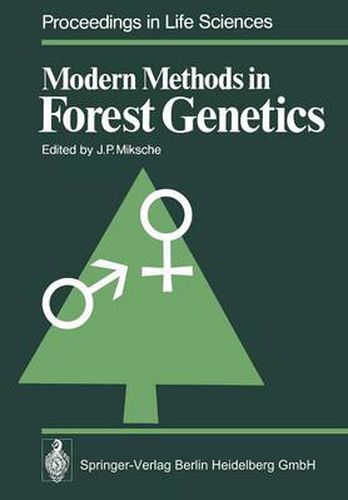Readings Newsletter
Become a Readings Member to make your shopping experience even easier.
Sign in or sign up for free!
You’re not far away from qualifying for FREE standard shipping within Australia
You’ve qualified for FREE standard shipping within Australia
The cart is loading…






This title is printed to order. This book may have been self-published. If so, we cannot guarantee the quality of the content. In the main most books will have gone through the editing process however some may not. We therefore suggest that you be aware of this before ordering this book. If in doubt check either the author or publisher’s details as we are unable to accept any returns unless they are faulty. Please contact us if you have any questions.
The present volume contains papers developed from courses given at the International Union of Forest Research Organizations (IUFRO) Bio chemical Genetics Workshop (Working Party S.04-5) held at the Univer sity of Gottingen, Germany on July 5 through 28, 1973. The workshop was organized by Professor Robert G. Stanley and was held in memory of Professor Klaus Stern. Unfortunately, both met with untimely deaths. Professor Stanley was also instrumental in initiating the process of having the workshop proceedings published. I was asked by the workshop participants to complete this task, and I wish to acknowledge their cooperation, advice and encouragement. In addition to the courses and subsequent papers resulting from the above workshop, we have included some papers by colleagues who were unable to attend the meeting. The contents of this text may, there fore, be considered a working-manual of generally modern techniques that are applicable to forest genetics and breeding programs. The chapters are placed in five major categories. The first three categories follow according to classes of chemical constituents in herent to plants which are nucleic acids (DNA, RNA) , primary gene products (amino acids, proteins and enzymes) and primary and secon dary metabolites (carbohydrate polymers, resins, phenolics, pigments, etc.). The fourth category is concerned with the interaction of en vironment and gene systems. Indirect selection, crossing and proto plasmic and flowering manipulation are factors covered in the fifth category.
$9.00 standard shipping within Australia
FREE standard shipping within Australia for orders over $100.00
Express & International shipping calculated at checkout
This title is printed to order. This book may have been self-published. If so, we cannot guarantee the quality of the content. In the main most books will have gone through the editing process however some may not. We therefore suggest that you be aware of this before ordering this book. If in doubt check either the author or publisher’s details as we are unable to accept any returns unless they are faulty. Please contact us if you have any questions.
The present volume contains papers developed from courses given at the International Union of Forest Research Organizations (IUFRO) Bio chemical Genetics Workshop (Working Party S.04-5) held at the Univer sity of Gottingen, Germany on July 5 through 28, 1973. The workshop was organized by Professor Robert G. Stanley and was held in memory of Professor Klaus Stern. Unfortunately, both met with untimely deaths. Professor Stanley was also instrumental in initiating the process of having the workshop proceedings published. I was asked by the workshop participants to complete this task, and I wish to acknowledge their cooperation, advice and encouragement. In addition to the courses and subsequent papers resulting from the above workshop, we have included some papers by colleagues who were unable to attend the meeting. The contents of this text may, there fore, be considered a working-manual of generally modern techniques that are applicable to forest genetics and breeding programs. The chapters are placed in five major categories. The first three categories follow according to classes of chemical constituents in herent to plants which are nucleic acids (DNA, RNA) , primary gene products (amino acids, proteins and enzymes) and primary and secon dary metabolites (carbohydrate polymers, resins, phenolics, pigments, etc.). The fourth category is concerned with the interaction of en vironment and gene systems. Indirect selection, crossing and proto plasmic and flowering manipulation are factors covered in the fifth category.